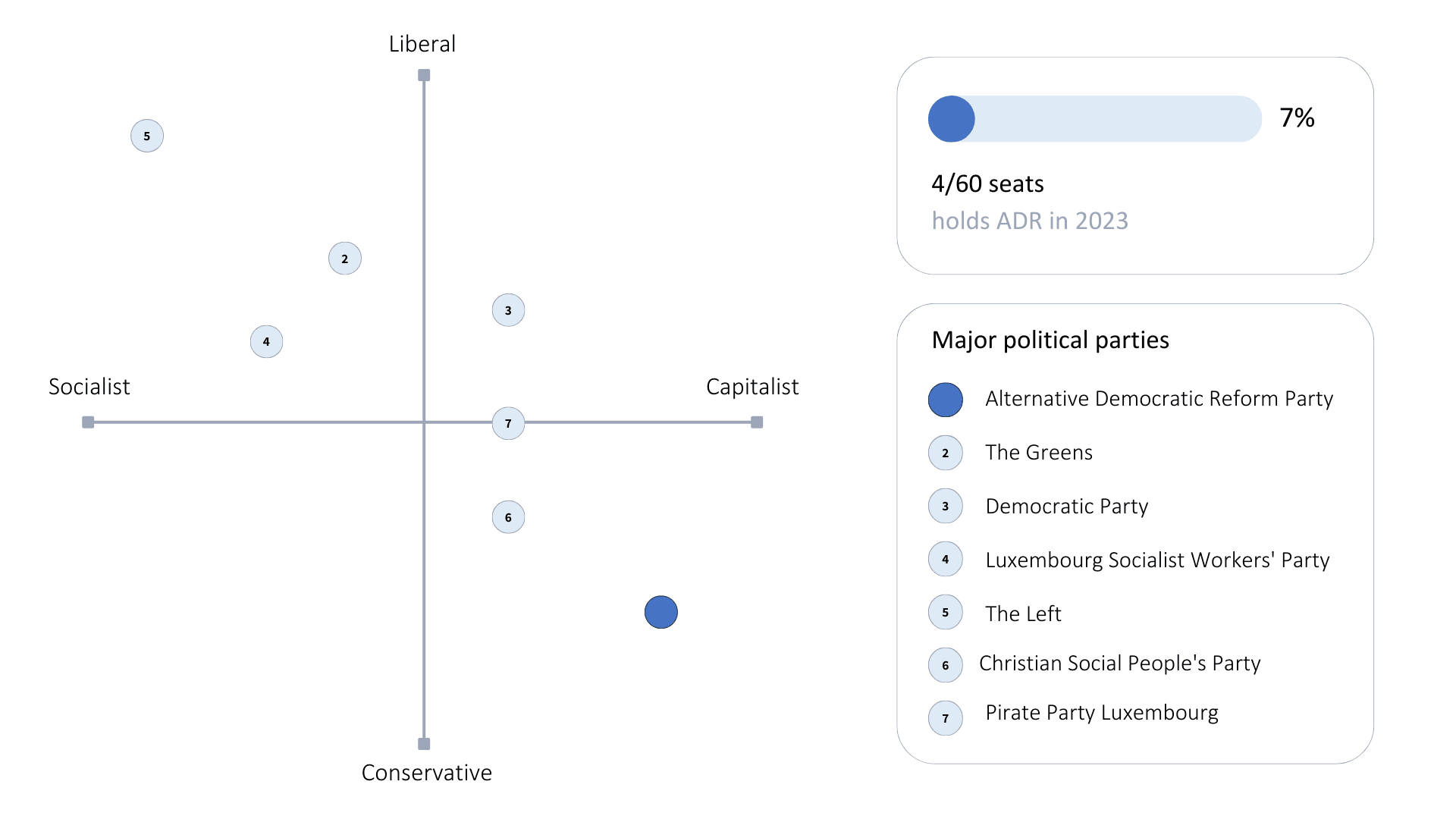
Alternative Democratic Reform Party — Alternativ Demokratesch Reformpartei (ADR)
In this article, we will take a closer look at the Democratic Party of Luxembourg, analyzing its structure, leadership, current political stance on key issues and historical evolution.
The Alternative Democratic Reform Party, known as ADR, stands as a distinctive force in Luxembourg's political landscape. Established in 1987 with a singular mission to advocate for pension parity between public servants and private-sector employees, the ADR has evolved into a social-conservative and national-conservative political entity with populist leanings.
ADR party at a glance
What distinguishes the ADR from other political groups in Luxembourg is its journey from a single-issue platform to a comprehensive conservative agenda. While initially focusing on pension reform, the party's political successes necessitated the development of stances on a wide array of public policy matters. As a result, it has embraced positions favoring economic liberalism and it is the largest party in Luxembourg to adopt a softly Eurosceptic stance.
As of today, the Alternativ Demokratesch Reformpartei commands 4 seats out of 60 in the Chamber of Deputies, positioning itself as the fifth-largest party in terms of parliamentary representation.
The ADR is tied to a labor union, called Neutral Union of Luxembourg Workers (NGL), the third-largest general trade union in the country. The party is supported both by the older generation and younger people with low income.
Political Guide

Structure and representativeness
The Alternative Democratic Reform Party (ADR) in Luxembourg is a political force characterized by its organizational depth and grassroots presence. With a membership base of approximately 1,800 individuals, it ranks as the fourth-largest party in terms of membership within the country's political landscape. At the helm of the ADR stands Fred Keup, who serves as the party's president, guiding its direction and representing its core principles.
The ADR's organizational framework is robust, comprising both national bodies and local structures, along with a unique division known as ADR Fraen (ARD Women). In addition, there is also a youth group called ADRenalin, founded in 1999, which acts as an independent entity.
The inner life of a party
At the national level, the party's decision-making apparatus consists of three key components.



Electoral system divides the country into four constituencies. The number of seats allocated to each constituency is proportional to its population
People and influence in the party
Key personnel profiles
Within the Luxembourg ADR party, a constellation of individuals holds pivotal roles across various spheres, contributing to the party's direction and influence. Let's explore the prominent figures in the ADR, classifying them according to their respective fields of action.
Leaders of the party





Other key members of the party




In last Chamber elections in 2023 the ADR has secured 9% share of the votes. The Luxembourg ADR holds a significant presence in the Chamber of Deputies, it ranked as the fourth-largest party with 5 seats out of 60 after the 20123 legislative elections.
These seats are divided among member countries based on their population size.
ADR’s current political stance
In the political spectrum, the Luxembourg ADR party is situated towards the right and the party is commonly described as nationally conservative and economically liberal.
The party and its cornerstones
The party has undergone a notable evolution since its founding as a single-issue party dedicated to achieving pension equality between the public and private sectors. Over its initial decade, the ADR party effectively made pension reform its central campaign focus, achieving significant success by compelling the government to address most of its demands by 1998.
Party views visualization

Rather than resting on its laurels, the ADR has diversified its policy platform to encompass a broad spectrum of public policy areas.
In the 2004 European elections, the party initially backed the proposed European Constitution. However, by spring 2005, due to internal pressures, the party changed its stance. The ADR's primary concerns about the European Union revolve around perceived shortcomings in democracy and transparency.
Political program
The Alternative Democratic Reform Party has laid out its key priorities for the upcoming legislative elections, focusing on pivotal areas such as population and growth, security, taxation, family, housing, language, and pensions. You can download the full ADR program on their website and here, we present a condensed summary of the ADR's political program.
The ADR is keen on addressing the concept of Luxembourg becoming a "1-million-inhabitant state." They believe that this significant idea should be presented to the public through a referendum, sparking a wide-ranging conversation in society. If the majority of the citizens oppose this vision, the ADR considers potentially limiting immigration. However, they recognize that such a move would require discussions with Brussels.
To address security concerns, the ADR advocates for increased police presence and stricter border controls, including the use of automatic number plate recognition technology. However, it remains committed to maintaining open borders. The party also proposes the expulsion of non-residents engaged in criminal activities and calls for greater transparency in police statistics.
While the ADR does not anticipate an extensive tax reform due to financial constraints, it remains open to selective relief measures. Such as systematic indexation.
The ADR promotes family-friendly policies, emphasizing that parents should not be compelled to relinquish childcare to an institution due to political, financial, or ideological pressures. The cornerstone of their policy is the parental subsidy, which allows one parent to stay at home with the family, either partially or entirely, until the child turns 12.
The ADR acknowledges the challenges posed by rapid population growth, especially in the housing market. It aims to make housing in Luxembourg affordable for Luxembourgers working in the country and opposes the displacement of local citizens due to soaring property prices.
For the ADR, the Luxembourgish language holds paramount importance in obtaining Luxembourgish citizenship, promoting integration, and participating in political life. The party advocates for Luxembourgish, both written and spoken, to become the primary and most widely used language in public spaces.
ADR seeks recognition of Luxembourgish as an official language of the European Union and the establishment of a national day celebrating Luxembourgish language and culture. Proficiency in Luxembourgish should be a prerequisite for public service roles, and non-Luxembourgish-speaking specialists should commit to learning the language.
Drawing from its historical roots, the ADR takes special responsibility for securing Luxembourg's pension system's future. It acknowledges the unsustainable aspects of the current pension system and aims to reform it urgently, ensuring that pensions are not reduced, and retirement age remains unchanged.
Party representation
The Luxembourg ADR party exhibits a unique and multifaceted base of support, representing a spectrum of interests that distinguish it within Luxembourg's political landscape.
Electorate demographics
Historically, the ADR has found its strongest support among traditional, rural, and right-leaning voters, often drawing voters from the right-wing of the Christian Social People's Party (CSV). Its historical stronghold lies in the northern regions of Luxembourg; however, the party achieved its highest share of the vote in the Eastern constituency during the 2013 elections.
While the ADR's initial focus on pension equality solidified its base among pensioners, it has also resonated with a surprising number of young voters under the age of 24. The party's presence on the internet has further bolstered its appeal among young demographics, despite the leadership's limited focus on online engagement. The ADR finds popularity among individuals earning less than 30,000 euros annually, attracting those who may have felt excluded from recent economic growth. Similar to CSV and LSAP, it garners support from individuals with lower educational backgrounds.

| ADR | DP | CSV | Greens | |
| Environment | Low | Middle | Low | High |
| Electorate | Older | Young | Older | Young |
| Trade unions | No | No | Yes | Yes |
| Secularism | Yes | Yes | No | Yes |
The ADR's office is located in Berdorf
- Office location: 11 rue Biirkelt, Berdorf
- Phone number: (+352) 26 20 37 06
- Official website: adr.lu
Brief history of the party
The ADR Party of Luxembourg has a rich history spanning several decades. It was established in 1987, evolving through various political landscapes.
Emergence of the party: 1987-1991

- March 28, 1987: A manifestation in Luxembourg City protests disparities between public sector officials' pension scheme and the basic state pension for all.
- May 12, 1987: The party is founded as the Action Committee 5/6ths Pensions for Everyone.
- 1989: The ADR's remarkable success in the legislative elections, winning 7.3% of the vote and four seats, prompts a shift in strategy.
- November 12, 1989: The party's name changes to Action Committee 5/6ths
- Spring 1991: Josy Simon switches to the Democratic Party, causing the ADR to lose one of its deputies.
Entrance to the Parliament: 1998-2010
- August 3, 1998: A law is enacted to harmonize pension provisions between public sector employees and other workers, aligning with the ADR's original mission.
- 1999: The ADR gains momentum, receiving 9.4% of the vote and seven seats in the legislative elections.
- October 1999: ADR candidates secure positions in ten municipalities, with two winners in Luxembourg City and Esch-sur-Alzette.
- 2004: The ADR loses two parliamentary seats, falling below 10% of the vote.
- 2005 Eurosceptic stance: The ADR actively campaigns against the European Constitution, which narrowly passed with 56.5% of the vote.
- April 2, 2006: The party's name changes again to its current name of Alternative Democratic Reform Party”, dropping references to pension reform.
- May 1: Aly Jaerling leaves the party, leading to its loss of parliamentary group status.
- May 29, 2008: ADR deputies, along with Jaerling, are the only members not to vote in favor of the Lisbon Treaty.
- 2009: The ADR retains four seats but sees a reduced vote share of 8.1%.
Current events and challenges: 2010 to now
- June 8, 2010: The ADR joins the Alliance of Conservatives and Reformists in Europe, a Eurosceptic political party.
- 2013: The ADR's vote share decreases further from 8.14% to 6.64%, but the party regains a seat.
- 2015: The ADR campaigns against three referendum questions, marking a significant political victory.
- March 2, 2018: The ADR announces cooperation with the Wee 2050 - Nee 2015 citizen movement.
- COVID-19 pandemic: The ADR opposes government health measures, citing concerns over individual freedoms.
Frequently Asked Questions (FAQ)
Where does The ADR stand on the political spectrum?
Whom does the ADR primarily represent in terms of its voter base?
What are the core principles and values of the ADR party in Luxembourg?
What role does the ADR play in European politics
Source: dp.lu, gouvernement.lu, fr.wikipedia.org
We took photos from these sources: ADR website; ADR Facebook official page; Wikimedia; Steve Eastwood for Virgule.lu